

So for the next little while, I’m going to cover superheroes who are original to the screen and did not appear in comics first. This week and next, I’ll cover two stories featuring Will Smith as a superhero named Hancock.
Problem is, the two stories make up one seriously flawed film.
Hancock was directed by Peter Berg and written by Vince Gilligan and Vy Vincent Ngo. A little backstory: the genesis of the story was a spec screenplay written by Ngo in the late 1990’s titled Tonight He Comes. The tale of a superhero with severe personal problems who becomes involved with a meek security guard and his wife and son, Tonight He Comes attracted a lot of attention in Hollywood and shuffled around development hell for a long time before finally going into production on the strength of Gilligan’s rewrite (which changed almost everything about the story, including the big second half twist which we’ll cover next week).
Some have claimed that the movie is a cautionary tale about the Hollywood development process, the rewrites and re-rewrites and studio notes that grind all the rough edges off an otherwise interesting vision and smooth it down to bland, easily digested pap (a true indictment in many cases). But I’ve read Tonight He Comes, and it kinda blows. Not only would I have hated the movie if it used that original script, I probably would not even have gone to see it. [If you want to read the script and form your own opinion, the link above goes to a site which links to a PDF of the screenplay. Be warned, there’s a page missing, and it’s a critical one.]
But what about the movie? Let’s take a look.
Hancock opens in true action movie fashion with an action scene. A group of thugs flee police on a Los Angeles freeway while spraying machine gun fire out the windows. If only there were a hero who could stop them. And there just happens to be such a hero. His name is Hancock, and he’s, uh…
Sleeping off a drunk on a bus stop bench. Not a good first impression. A kid wakes him up and alerts him to the crisis in progress, but when Hancock insults him, the kid calls him an asshole, a sentiment repeated by a passing blonde Hancock gropes. This will become a theme.
Hancock grabs a fresh bottle of whiskey and takes off to join the high-speed chase. And he does not exactly fly with the precision of the Blue Angels.
He catches up with the vehicle, but the crooks don’t give up without a fight. They unload their machine guns on Hancock, shattering his sunglasses and breaking his whiskey bottle. Mistake.
Smith channels a little Samuel L. Jackson before impaling their vehicle on the spire of the iconic Capitol Records building. Later, he’s in a bar, drinking and scribbling on a napkin, when an honest-to-goodness groupie walks in.
She’s hot, but not very bright. Smith plays Hancock’s tired cynicism–who knows how many times he’s played out this exact scene?–well, taking the girl back to his nasty trailer and instructing her in the rules before they do the deed. Â What rules?
Six words that will be very familiar if you followed my Superman recaps: Man of Steel, Woman of Kleenex. Which results in this moment cut from the theatrical release, but present on the DVD.
Those columns of light above the trailer’s roof are from holes shot through it by the bullet-force of Hancock’s ejaculation. Afterward, Hancock apologetically points at the holes in his roof and says to the terrified girl, “That ain’t fair to nobody.” The relationship goes nowhere after that.
Next, we see Ray Embry, played by Jason Bateman. Described by a colleague as “the Bono of Public Relations,” Ray is giving a presentation to the board of a huge drug manufacturer. He proudly displays the All Heart logo, a logo he says the company can display on all their products if they only give away their latest tuberculosis drug for free. It’s an awkward presentation and he’s laughed out of the room. You have to wonder how he got such a reputation if that’s how good he normally is at his job.
While on his way home, Ray lets himself stupidly get gridlocked on a train track as a train approaches. And because his car is a piece of crap, he has trouble getting the door open to get out, and then can’t get his seatbelt undone. Remember that, kids: seatbelts kill.
Luckily for Ray, Hancock is there to save him. Unlucky for everyone else. Hancock tosses Ray’s car on top of the car behind his and then lets the train hit him. It derails spectacularly.
Only Bruce Willis survives, and he soon discovers… Wait, different movie.
A crowd forms to jeer Hancock with a chorus of “asshole,” but Ray whistles them down and publicly thanks Hancock for saving his life.
Hancock takes Ray home, since his car is kinda FUBAR’ed, and is invited to stay for Spaghetti Madness. Ray’s son Aaron is excited to have a superhero for dinner, but his wife Mary (Charlize Theron), apparently familiar with Hancock’s reputation, is not so pleased.
So they have an uncomfortable dinner, in which it’s clear Mary does not want Hancock there, but as Hancock’s leaving, Ray pitches him a public relations idea: Ray wants to rehabilitate Hancock’s public image, so people will love him.
So Hancock thinks about it and comes back. After terrorizing a neighborhood bully who’s been harassing Aaron (the kid makes the mistake of saying a word that begins with “a” too many times), Hancock begins his work with Ray, watching Youtube videos of the many ways in which he’s been a public nuisance. Then Mary and Aaron come home, and Mary turns on a news show which announces the fact that there’s a warrant out for Hancock’s arrest. And Mary looks awfully happy at the misery she’s putting Hancock through.
But Ray thinks it’s a brilliant idea. His plan: Hancock turns himself in and sits in jail a while, letting the crime rate go through the roof until the city has no choice but to release him and ask for his help. Hancock initially balks, but Ray is earnest and persistent, and Hancock finally gives in.
Prison is not fun. First thing, his fellow prisoners attempt to intimidate him.
They apparently think he must have lost his powers or something, otherwise why let himself be thrown in jail? But once he visits a particularly horrifying punishment (cut out of the theatrical version, but shown on the DVD)Â on two of the guys who try to mess with him and use a particular verboten word, everybody else leaves him alone.
Hancock then undergoes a time of rest and rehabilitation. In sessions with Ray, he learns how to be a hero without all the assholery, and also sits in on anger management group therapy, which barely starts to show progress within a couple of weeks. In the meantime, alone in his cell, Hancock scratches pictures into the wall, much like the doodles he drew in the bar in the beginning. Two themes recur in the drawings: an eagle in flight, and this…
It looks like a parent and child. And we realize that we still don’t know Hancock’s backstory, but something tragic must have happened to him. And the big question is, is Hancock the child in the picture, or the parent?
And then, finally, the mayor asks for the release of Hancock so he can stop a bank robbery in progress. Hancock shaves and changes into a tight leather costume he swore he would never wear. He lands without breaking anything and goes out of his way to tell each of the cops, “Good job.”
And before I slide into the rest of the scene, I want to mention that by this point in the film, it’s pretty good. Will Smith is really believable and appealing as the deeply lonely hero who masks it with an outward show of unpleasantness (in much the same way that Digger does, although I was writing Digger before Hancock ever came out). And Jason Bateman is really likable as the earnest, good-hearted Ray. The film manages to be not just a satire on superheroes (an easy target) but also a satire on our feminized, over-therapeutic, over-lawyered, politically correct culture. And it’s working pretty well so far.
Hancock goes to save a pretty female officer who is wounded and pinned down by fire. He goes out of his way to ask permission to touch her and emphasize that he means nothing sexual by the contact. It’s a funny moment.
He carries her out of the line of fire, and then proceeds to take out the robbers until only one is left.
That thing in his hand is a deadman switch, Â set to detonate the C-4 explosive wired to each hostage if he lets go of the button. And here’s where the film starts to break down.
Because seriously, what kind of shitty bank robbery is this? The robber demands that Hancock tear open the vault and fly him and the $300 million in small bills (weighing several hundred pounds) to safety. But was that the original plan? Because on the one hand, it looks like Hancock’s intervention is bad news for the robbers, but on the other hand, it doesn’t look like they had any other plan for getting into the vault, so maybe they planned to have Hancock in on the action from the start. It’s confusing, to say the least.
Doesn’t matter. Hancock, after being prompted with a certain word, chops off the robber’s hand and saves the hostages. He is finally recognized as a real hero. Everybody’s happy. The end.
Wait, no. We’re only halfway through. What the hell?
Be here next week.

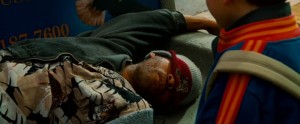
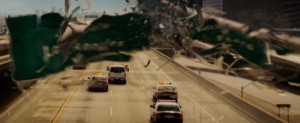



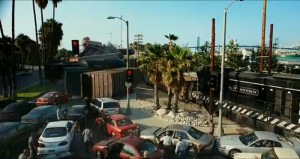

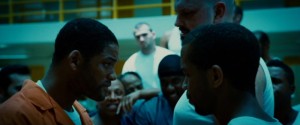


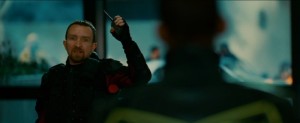



And see, I though Bateman’s character was insufferable. Not that he wasn’t a good foil for Hancock, but that the movie took his side and we were obviously supposed to think his stupid point of view was the “right” one.
I like Bateman’s character. I mean, yeah, All Heart is silly lefty nonsense, but if I blew off every movie that idealized silly lefty nonsense, I’d have damn few movies to watch. At least he actually does more than try to spend other people’s money on his pie-in-the-sky vision. He actually tries to put his ideals into practice by trying to help the most unpleasant person in the world. I like the way he’s able to tell Hancock the truth to his face in a way that not only doesn’t get him beaten up, but gets Hancock to listen, and I think Bateman’s performance sells it.